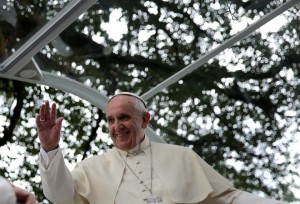 It took me a month, but I’ve finally read through all of Pope Francis’s environmental encyclical, “Laudato Si.”
It took me a month, but I’ve finally read through all of Pope Francis’s environmental encyclical, “Laudato Si.”
If you read the media coverage on it, you already know a bit of what’s in it: Francis calls for moving away from fossil fuels, speaks out for bold political action to combat global warming, blasts rich countries and corporations for exploiting the poor, and urges all of us to be less consumerist.
All of that’s worth reading in and of itself, of course, but it’s all a bit old news. So here’s some things I found in Laudato Si that you might have not seen in last month’s coverage that caught my eye:
1. Pope Francis the Urban Planner
I did not realize I wanted to know more about a theology of urban spaces until Pope Francis started writing about it. Being born and raised in Buenos Aires, it makes sense that he’d have opinions about cities, and he isn’t shy about them:
If architecture reflects the spirit of an age, our megastructures and drab apartment blocks express the spirit of globalized technology, where a constant flood of new products coexists with a tedious monotony.
He goes on to reflect on the need for urban planning that respects the cultures and traditions of the community, the importance of green space in cities, and the way flourishing communities can grow even in slums and tenements and create a basis for improving those communities if urban planners and city leaders listen to them. He talks about the need for effective public transportation and warns against gentrification. It’s both a lovely and pragmatic reflection on city life, and not what I was expecting to find when I started reading.
2. Ecumenical Footnotes
The encyclical is a pretty explicitly ecumenical document – he addresses it to “all who share our common home,” and Orthodox metropolitan John Zizioulas was at the release event. But the Orthodox church isn’t the only one that gets a shoutout in the text. I was surprised to find this lovely excerpt from Sufi poet Ali al-Khawas:
“Prejudice should not have us criticize those who seek ecstasy in music or poetry. There is a subtle mystery in each of the movements and sounds of this world. The initiate will capture what is being said when the wind blows, the trees sway, water flows, flies buzz, doors creak, birds sing, or in the sound of strings or flutes, the sighs of the sick, the groans of the afflicted…”
(I’m apparently not the only one who was intrigued by the reference – al-Khawas’s Wikipedia article consists almost exclusively of noting that he was quoted by the pope. Pope Francis, gettin’ obscure with his sufism references!)
3. Not-Quite-Pantheist Theology
Laudato Si got a lot of attention for its policy and science talk, but it’s very much a work of theology. Pope Francis waxes poetic about how God is encountered in the natural world – but he’s clear that we shouldn’t take that to mean nature is itself divine.
Saint John of the Cross taught that all the goodness present in the realities and experiences of this world “is present in God eminently and infinitely, or more properly, in each of these sublime realities is God”. This is not because the finite things of this world are really divine, but because the mystic experiences the intimate connection between God and all beings, and thus feels that “all things are God.”
I’ve seen conservative Catholics criticize the encyclical (and environmentalism more generally) for deifying nature, but I think Francis deserves more credit for that subtle bit of theology. He had me flashing back to college Environmental Theology debates about biocentrism vs anthropocentrism, and addressed it gracefully.